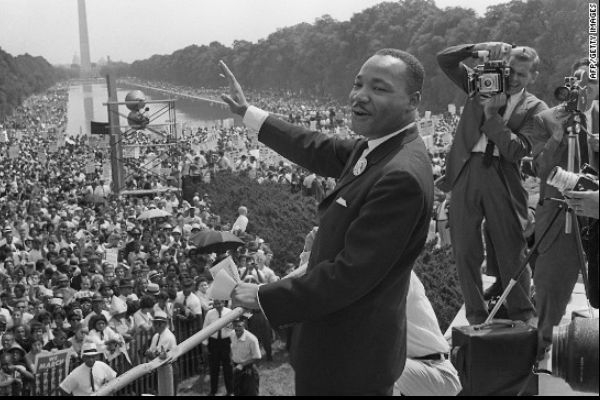 After Dr. Martin Luther King, Jr.�s historic and heroic 1967 �Beyond Vietnam� speech, where he opposed the U.S. war in Southeast Asia, he received a barrage of criticism from editorial boards, donors and even other civil rights leaders.
After Dr. Martin Luther King, Jr.�s historic and heroic 1967 �Beyond Vietnam� speech, where he opposed the U.S. war in Southeast Asia, he received a barrage of criticism from editorial boards, donors and even other civil rights leaders.Ralph Bunche (who in 1950 became the first person of color to receive the Nobel Peace Prize) told the New York Times, �[King] should realize that his anti-U. S. in Vietnam crusade is bound to alienate many friends and supporters of the civil rights movement and greatly weaken it - an ironic twist for a civil rights leader.�
King�s organization, the Southern Christian Leadership Conference faced both financial and political repercussions for not �staying in their lane� and just sticking to �civil rights issues.�
Today some have questioned the need for the peace movement to stand up for racial equity. How, they ask, does justice for Trayvon Martin, immigrant rights or ending racial profiling contribute to changing U.S. foreign policy?
They clearly have a lot to learn from the legacy of Dr. King.
If peace activists can applaud the courage of Dr. King�s linking the �the giant triplets of racism, materialism, and militarism� in 1967, then why do they not see the need to do the same today?
Unfortunately, many in today�s social justice movement have lost sight of the vital links between racial equity, economic justice and peace.
Just as racism and bigotry is part of a system of maintaining power and privilege, so is militarism and a foreign policy premised on the threat of military action and nuclear annihilation.
Racism is not an accident or a happenstance of history, and neither is militarism. It is also bound to maintaining the privilege of the 1% and is fortified and enforced by what President Eisenhower called the �military industrial complex.�
The brilliance of Dr. King�s leadership is that he saw that segregation and racism prop up the system of the rich and powerful and is essential to their ability to maintain control. He knew that as long as the vast majority of people - what we have come to call the 99% - were divided, the rich and powerful would control the direction of government policy, the levers of the economy and our future.
Peace Action and many in the broader peace movement stood with those who were outraged over the murder of Trayvon Martin, an unarmed teenager killed in Florida. We understand that the policies of the 1% seek to divide the natural allies in the struggle for a more just and peaceful community and world. We know that we must struggle for peace and justice both at home and abroad.
The peace movement has a stake today in building a movement powerful enough to challenge those who would restrict voting rights or violate civil liberties with racial profiling. Not only because it is morally right - which it is - but because it is a necessity in order to build a much broader and more powerful movement capable of ending militarism and building a new relationship between the U.S. and the rest of the globe.
This week, on the 50th anniversary of the March on Washington for Jobs, Justice and Freedom, Peace Action joins with all those who celebrate the legacy of the civil rights movement and the life of Dr. King. The organizers of the August 24, 2013 March on Washington say, �It�s not a commemoration, it�s a continuation.� What better time to reflect on the movement building lessons of the civil rights movement.
The peace movement must help fulfill the dream of Dr. King. Fifty years later the struggle against racism, materialism, and militarism continues. It�s our responsibility.
By Press TV�originally�Published �by�Common Dreams
The Iran Project is not responsible for the content of quoted articles.












